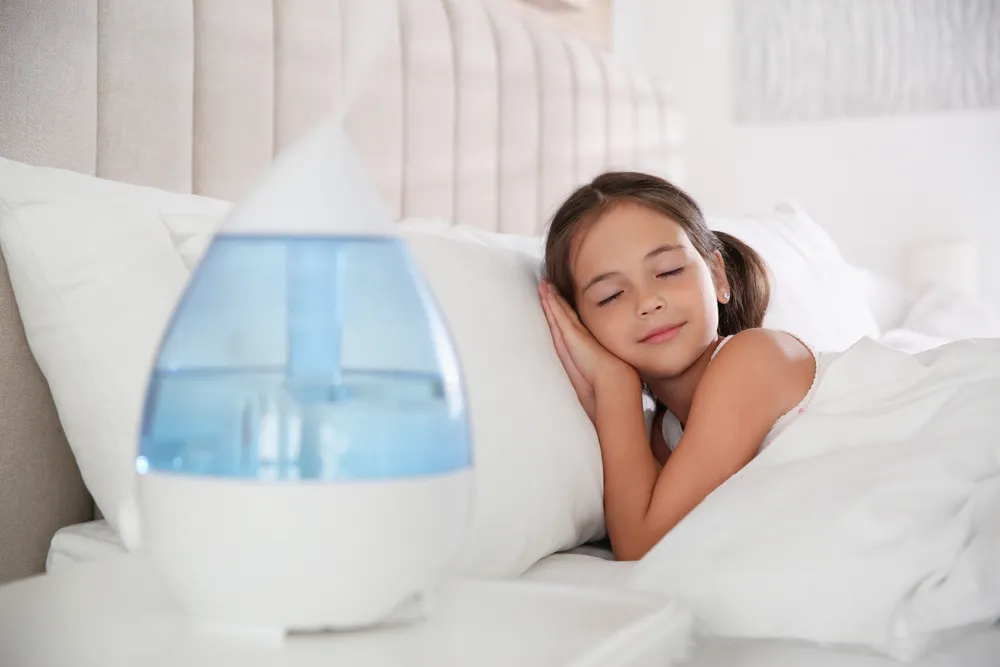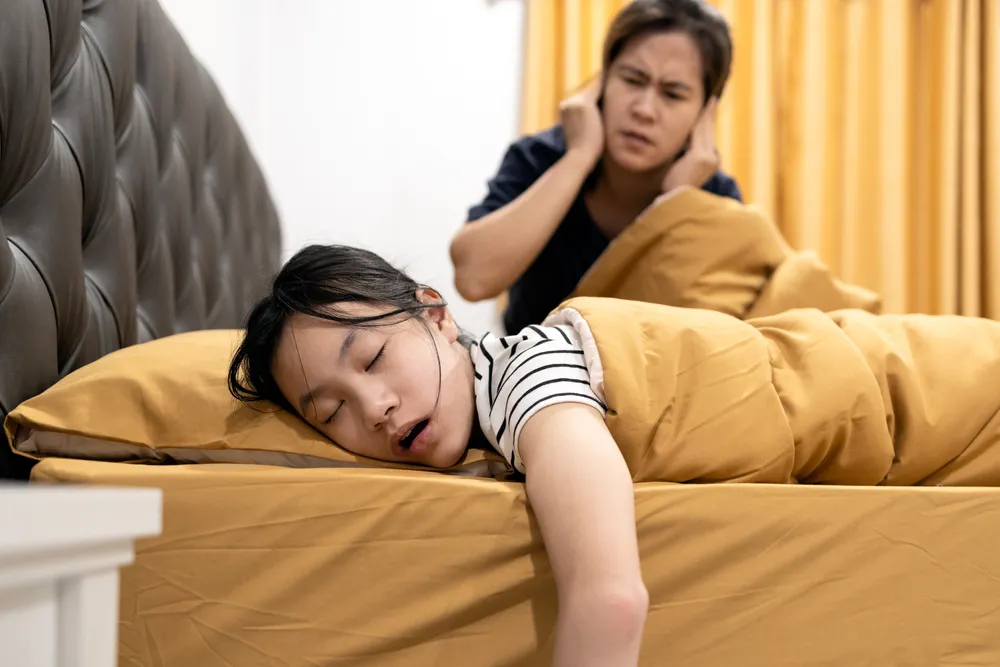Snoring isn’t just something adults do — kids can snore too, and it might be louder (and more common) than you’d expect. Sometimes it’s just a stuffy nose, but other times it could be a sign of something more serious. If you’re wondering how to stop snoring in kids, you’re in the right place. Many parents deal with this, and there are simple, helpful steps you can take to improve your child’s sleep — and yours too!
This article breaks it all down in simple terms: why it happens, when to worry, what causes snoring, what you can actually do about it and how to know if it’s time to talk to a doctor.
Because every kid deserves a good night’s sleep — and every parent deserves a little peace and quiet.

How to Stop Snoring in Kids?
To stop snoring in children, the key is to find out what’s causing it and take simple but targeted steps. Snoring could be a sign of allergies, enlarged tonsils, or even poor sleep habits. Some cases are easy to fix at home, while others may need a doctor’s help — especially if your child shows signs of sleep apnea or seems tired during the day.
Here’s what you can do:
- Check for common causes: Look for signs like nasal congestion, allergies, enlarged tonsils, or extra weight — all of which can block airflow and cause snoring.
- Improve sleep habits: Make sure your child has a regular bedtime, sleeps enough, and avoids screens before bed to support better rest.
- Change sleep position: Encourage side sleeping instead of back sleeping to keep airways open and reduce snoring.
- Try simple remedies: Use a humidifier, saline spray, or elevate the head of the bed to ease nighttime breathing.
- See a specialist if needed: If snoring is loud, constant, or comes with pauses in breathing, talk to a pediatrician or ENT to rule out sleep apnea or other conditions.
Pediatric ENT specialists at Penn Medicine Becker ENT & Allergy provide treatment plans and guidance to alleviate or stop childhood snoring. This ultimate guide will provide you with essential information on the causes, effects, and treatment options for snoring in kids.
What Causes Snoring in Kids?
Okay, so your kid snores. First off — you’re not alone, and it’s not something to panic about right away. But yeah, snoring in kids usually means something’s getting in the way of their breathing while they sleep.
Here are some of the usual suspects:
- Big tonsils or adenoids – These are those soft little lumps in the back of the throat or nose. If they’re too big, they can block airflow. This is actually one of the most common reasons kids snore.
- Stuffy nose – Could just be a cold or allergies. When kids can’t breathe through their nose, they end up breathing through their mouth, and that can lead to snoring.
- Sleep apnea – This one’s more serious. It’s when a kid’s breathing kind of stops and starts during the night. If your child snores loudly and seems tired or cranky during the day, it might be worth checking in with the doctor.
- Crooked nose (aka deviated septum) – Basically, the inside of the nose isn’t straight, and that can make breathing harder. You’d never know without a doctor looking though.
- Extra weight – Not always the case, but carrying extra weight can put pressure on the airway, especially during sleep.
- Asthma or other breathing stuff – If your child already has breathing issues, those can make snoring more likely too.
Bottom line? Snoring once in a while — probably fine. Snoring all the time, or with other weird stuff like gasping or being exhausted all day — time to talk to someone.
What Are the Effects of Snoring on Kids?
Snoring might not seem like a big deal at first — just some noisy breathing, right? But if your child snores a lot, it could actually mess with their sleep and cause some problems during the day too. When kids don’t sleep well, it can affect their mood, focus, and even how they grow and learn. Here’s how snoring can affect kids:
Tired all the time
If snoring keeps waking them up (even if they don’t remember it), they might feel tired, cranky, or slow during the day.
Harder time at school
Kids who don’t sleep well can have trouble focusing, remembering stuff, or keeping up with their classwork.
Moody or hyper
Poor sleep can lead to mood swings, irritability, or even acting out. Some kids seem extra energetic, but really they’re just overtired.
Possible growth or speech delays
In more serious cases, snoring linked to sleep apnea can slow down growth or affect speech if the body and brain aren’t resting properly.
Breathing trouble at night
If you hear your child gasping, pausing while breathing, or snoring loudly every night, it might be something called sleep apnea — and that should be checked out by a doctor.
If you’re seeing any of this — loud snoring, tired kid, struggling at school — it’s a good idea to talk to your pediatrician. Sometimes it’s just a stuffy nose, but sometimes it’s more than that, and getting better sleep can make a big difference.
How to Identify and Treat Snoring in Kids
If you suspect that your child may be snoring, it is essential to consult with an ENT specialist. They will likely perform a physical examination and may recommend additional tests, such as a sleep study, to determine the cause of the snoring.
Treatment options for snoring in children depend on the underlying cause. Some potential treatments include:
- Tonsillectomy or adenoidectomy (surgical removal of enlarged tonsils or adenoids)
- Weight loss and lifestyle changes for children who are overweight or obese
- Allergy or sinus treatment
- Continuous positive airway pressure (CPAP) therapy for sleep apnea
- Surgical correction of a deviated septum

Home Remedies for Stopping Snoring in Kids
If your kid snores now and then, it might not be anything serious — and there are actually a few simple things you can try at home that might help. Most of these are easy changes that don’t involve any medication or doctor visits (at least to start with). Think of it as a way to help them breathe easier and sleep better.
Here are a few things worth trying:

- Watch for allergy triggers
Things like dust, pet hair, and even some laundry detergents can mess with a kid’s breathing at night. Vacuum their room often, wash stuffed animals, and keep pets out of their bed if needed. - Switch up their sleeping position
Try to get your child to sleep on their side instead of their back. When kids sleep on their backs, their tongue and soft tissues can fall back a little and block airflow. A body pillow or even a rolled-up blanket behind them can help keep them on their side. - Use a humidifier in their room
Dry air can make snoring worse, especially if your child has allergies or a stuffy nose. A cool-mist humidifier can keep the air moist and help them breathe easier at night. Just be sure to clean it often so it doesn’t get moldy. - Help with stuffy noses
If your child has a cold or allergies, use a saline nasal spray or rinse to help clear things out. A warm bath or a few minutes in a steamy bathroom before bed can also loosen up mucus. Keeping their room clean and dust-free helps too. - Keep bedtime chill and consistent
A regular bedtime, no screens before bed, and a quiet, comfy room can make a big difference. Overtired kids tend to snore more, so good sleep habits matter.
When to Get Help for Your Child’s Snoring
If your kid snores once in a while — like when they have a cold or fall asleep in a weird position — that’s usually nothing to worry about. But if it’s happening most nights, or it sounds pretty loud or rough, it might be a sign that something else is going on.
Here’s when it’s a good idea to talk to your pediatrician or an ENT (ear, nose, and throat) doctor:
- They have other health stuff going on
Things like allergies, asthma, frequent colds, or being overweight can make snoring worse. If your child already deals with any of that, and snores too, it’s worth checking in with a doctor. - It happens every night
If your child snores more nights than not — especially if it’s loud enough to hear through a door — it could be a sign that their airway is getting blocked while they sleep. - They pause, gasp, or struggle to breathe
Hearing your kid stop breathing for a few seconds, gasp, or make choking sounds in their sleep? That’s a red flag. This could be a condition called sleep apnea and needs to be checked out. - They’re always tired during the day
Even if they’re going to bed on time, kids who don’t sleep well because of snoring might be cranky, fall asleep in the car, or struggle to stay awake at school. - Their behavior is all over the place
Poor sleep can make kids seem hyper, moody, forgetful, or just “off.” Sometimes it even gets mistaken for ADHD, when really it’s sleep-related. - They’re falling behind in growth or school
Sleep plays a big role in growing and learning. If your child seems small for their age, is struggling in school, or has trouble focusing, it might be connected to how well they’re sleeping at night.

Healthy Habits That May Help Kids Stop Snoring
Try these daily habits to improve your child’s sleep and reduce snoring:
- Stay hydrated and eat well: Water and balanced meals support breathing, reduce mucus, and improve sleep quality.
- Set a consistent bedtime: Regular sleep schedules help prevent overtiredness, which can make snoring worse.
- Cut screen time before bed: Avoid tablets or TV an hour before bedtime to help their brain wind down.
- Encourage daily movement: Physical activity supports healthy weight and better breathing during sleep.
- Keep their room cool and quiet: A calm, comfortable sleep space helps with deeper rest.

Strategies for Reducing Snoring in Children
There are several strategies that can help reduce snoring in children, including:
- Using a white noise machine or fan to drown out snoring sounds and promote a more restful sleep environment.
- Encouraging your child to practice good nasal hygiene by blowing their nose regularly and using saline sprays or rinses as needed.
- Teaching your child relaxation techniques, such as deep breathing exercises, to help them relax before bedtime.
- Monitoring your child’s caffeine intake, as caffeine can disrupt sleep patterns and contribute to snoring.
- Encouraging your child to avoid smoking or exposure to secondhand smoke, as it can cause inflammation in the airways and increase the risk of snoring.
Can Snoring Cause Long-Term Problems in Kids?
Snoring might seem harmless, but if it’s happening a lot — and especially if it’s loud or comes with things like gasping, tiredness, or behavior changes — it can turn into something bigger over time.
Here’s what can happen if chronic snoring goes unchecked:
- They might struggle in school
Poor sleep messes with memory and focus. Kids who snore a lot may have a harder time learning, paying attention, or keeping up with classwork. Some studies even link childhood snoring to lower grades down the road. - They may act out or seem off emotionally
Tired kids can be moody, cranky, or super hyper — not because they’re “bad,” but because they’re not sleeping well. In some cases, snoring has even been mistaken for ADHD. - Their growth can slow down
Kids grow while they sleep. If snoring is cutting into deep sleep, it might mess with growth hormone production, which can affect height, weight, and even speech development. - It can affect their heart over time
If snoring is caused by something more serious like sleep apnea, it can put extra strain on the heart and raise blood pressure. This doesn’t happen to every child, but it’s worth keeping an eye on. - It can cause social issues
Kids who snore loudly might feel embarrassed at sleepovers or camp — or get teased. And that can take a toll on their self-esteem over time.
Importance of Medical Evaluation
A professional evaluation by an ENT specialist or a sleep specialist can help identify the underlying cause of your child’s snoring. The healthcare provider may recommend diagnostic tests, such as a sleep study (polysomnography), to monitor your child’s sleep patterns and breathing. Based on the findings, they can suggest appropriate treatments, which may include:
- Medical interventions (e.g., nasal corticosteroids, allergy treatments)
- Lifestyle modifications (e.g., weight management, positional therapy)
- Surgical options (e.g., tonsillectomy, adenoidectomy) for severe cases
Seeking professional help ensures that your child receives the most effective treatment, improving their sleep quality and overall well-being. Remember, early intervention can prevent potential complications and promote healthier sleep habits for your child. Schedule your consultation with our ENT professionals and improve your child’s health.

